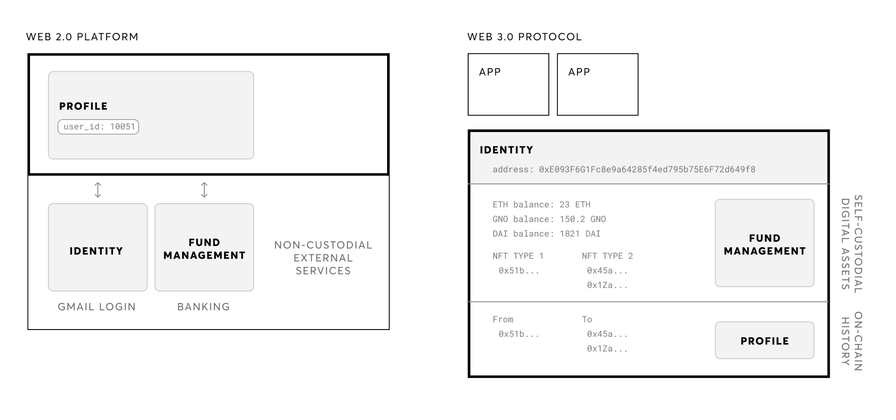Inventories, Not Identities. Why multisigs are the future of online… | by Kei Kreutler | Gnosis

my notes ( ? )
The Identity Stack ... Traditional online bank accounts represent balances as numbers stored in a centralized database... requires placing trust in a banking institution. Blockchain protocols plus private key cryptography ...introduce ... full possession of digital assets, without having to trust a third party. Hence the terms “self-custodial” or ... “self-sovereign”...
blockchain-based accounts [allow] to “own” your identity... as did W3C's Decentralized Identifiers (DIDs):
- private control over their identifying data and can grant, revoke, and share partial access to it...
- an identity standard as a universal login across platforms (cf Mozilla’s Gravatar project)
an Ethereum-based account does not require personal data and you can create an unlimited number of them using wallet applications like Metamask, which can connect to Ethereum and some web 2.0 platforms (eg Discourse). That wallet is actually a very powerful identity regime:
- provides fund management, identity and a profile through one software account - whereas Web2 platforms pointed to different services.
- Blockchain-based accounts could provide identity in the form of a unique address of the account, a function the account can execute, or tokens the account holds.
- Implementations already use NFTs to provide decentralized identity.
- Verifiable credential tools (eg zero knowledge proofs) allow someone to verify they possess personal data without publicly revealing it.
- relational web of trust solutions can provide decentralized verification of unique identity ... allow subjects to signal they sufficiently trust another in the context of the application,
Identity is on a spectrum: private, persistent and not-persistent pseudonymity, real life. We need a technical stack that supports not an identity, but a collection of identities.
Wallets can be multi-signature: have as owners multiple keys (which can be other wallets), can require multiple key signatures to confirm a transaction... allow cooperatives to hold resources in common ... liquid democracy (through delegation) ... multi-signature accounts have become the operating system for DAOs. multi-signature accounts presuppose groups or identity collections as their primary unit -> composable identity.
web 3.0 accounts will underpin the metaverse's interoperability... likely candidate for navigating the metaverse because they offer wallets, identity, and login functions ... function like in-game inventories, holding assets including identities, complete with cross-platform and cross-game narratives, which can be worn like clothing suited to their platform along with the corresponding accountable reputation, and cooperatively shared.
Multi-signature accounts provide accessible infrastructure for coordinating groups.
Read the Full Post
The above notes were curated from the full post blog.gnosis.pm/inventories-not-identities-7da9a4ec5a3e.Related reading
More Stuff I Like
More Stuff tagged nft , web3 , wallet , cooperatives , game , metaverse , identity , decentralised , multisig
See also: Blockchain, Crypto, NFTs etc , Social Web , Politics